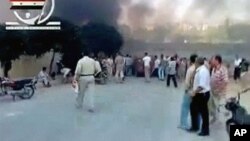As Syrian tanks shelled the flashpoint town of Hama Wednesday, the U.N. Security Council overcame months of division and strongly condemned the on-going violence. The U.N.’s most powerful body expressed “grave concern” at the deteriorating situation in Syria, where some 1,700 people have died and thousands more have been arrested or disappeared since the government began a bloody crackdown on pro-democracy protesters in mid-March. It was not easy for the Council to reach consensus.
In its statement, the Security Council condemned the “widespread violations of human rights and the use of force against civilians by the Syrian authorities.” The Council also called on the Syrian authorities “to fully respect human rights and to comply with their obligations under international law,” and warns that those responsible for the violence should be held accountable.
|
Syria's Hama - Flashpoint City |
|
For a second time, the Syrian city of Hama has become a flashpoint of dissent against a government led by a member of the Assad family.
|
The Security Council also demanded the immediate end to all violence and urged restraint on both sides, including attacks against state institutions - a reference to violence committed by demonstrators and included to satisfy Russia and other members who felt blaming the government alone was unfair. But Western diplomats have stressed that one cannot equate what protesters have done in self-defense to what the government has perpetrated against its own people.
The Council also stressed that the only solution to the crisis is through an inclusive and Syrian-led political process that aims to “address the legitimate aspirations and concerns” of the Syrian people. And it notes that the Assad government has promised reforms, but has failed to make progress in implementing them and urged the government to fulfill its commitments.
But after the full council adopted the statement, Syria’s close ally and neighbor, Lebanon, employed a rarely used procedural loophole and “disassociated” itself from the statement.
Deputy Ambassador Caroline Ziade:
“And while we express our deep regret for the loss of innocent victims and we offer our condolences to their families, we hope for Syria, the people and country, we hope that reform will lead to progress and prosperity," said Ziade. "But since Lebanon considers that the statement being discussed in our meeting today does not help in addressing the current situation in Syria, therefore, Lebanon disassociates itself from this presidential statement.”
But British Ambassador Mark Lyall Grant said that Lebanon’s disassociation was neither unprecedented nor does it detract from the Council’s unanimous and clear message to the Syrian regime.
“Barbarous acts must cease in Syria," said Lyall Grant. "The country must find its way onto a path of stability. This will only be achieved through the immediate cessation of violence and the implementation without delay of profound political reforms, respect of human rights and fundamental liberties, and genuine accountability for atrocities against protesters.”
The United States and European members had pressed for a resolution, which is stronger than the presidential statement that was adopted. But their efforts were blocked by Russia, China, India, Brazil and South Africa, who feared a resolution could lead to a similar situation as the one in Libya, where the Council authorized a no-fly zone and targeted bombings to protect anti-government protesters from attack by leader Moammar Gadhafi’s security forces.
U.N. Secretary-General Ban Ki-moon, who has been very vocal in calling for a cessation of violence in Syria, said the intensified military crackdown of the past several days has been “brutally shocking.”
“Once again I call on President Assad and the Syrian authorities to immediately cease all violence against their people, to fully respect human rights and implement reforms they have already announced," he said. "I further urge them to comply with the Security Council’s demand to allow independent and unimpeded access to international humanitarian agencies and to cooperate fully with the Office of High Commissioner for Human Rights.”
Mr. Ban told reporters that all killings should be investigated fully, independently and transparently, and those responsible should be held accountable.
Under the terms of the Security Council statement, Mr. Ban must update the Council within the next seven days on the situation in Syria.




